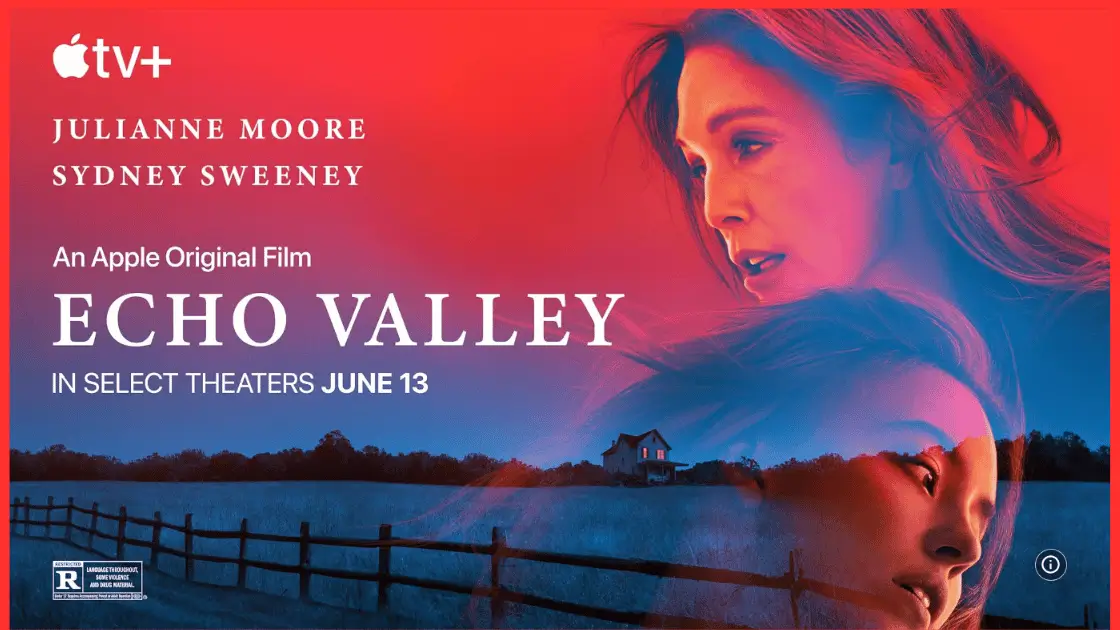Echo Valley is Rated R by the Motion Picture Rating (MPA) for language throughout, some violence and drug material.
Echo Valley Review
From the moment Kate (Julianne Moore) finds her daughter Claire (Sydney Sweeney) stumbling into their remote Pennsylvania horse farm, covered in blood and shaking like a ghost who just woke up inside her own nightmare, Echo Valley grips you. But it doesn’t do it with bombast or high-octane plotting. There are no screams, no sirens. Just the soft, unbearable sound of grief building in the chest — and the slow realization that this isn’t just a thriller. It’s something sadder, more urgent, and far more human.
Directed by BAFTA-winner Michael Pearce (Beast) and written by Brad Ingelsby (Mare of Easttown), this film could’ve easily coasted on genre formula: estranged mother, wayward daughter, mysterious crime. But it doesn’t. Instead, it veers into a space of emotional grayness that few thrillers dare to touch — where loyalty bleeds into denial, and love becomes a kind of quiet, personal damnation.
It doesn’t just meet the expectations of its premise. It shatters them and whispers, “What now?”
The Story & What It Tries to Say
Set on a desolate stretch of farmland haunted by past failures and unspoken truths, Echo Valley begins with a mystery: Claire arrives home in crisis, soaked in someone else’s blood, her words fractured, her hands trembling. But the film doesn’t move with the pacing of a classic whodunit. Instead, it burrows into something deeper — a question of what we’re willing to accept when love asks too much of us.
Kate, once a high-level equestrian coach, now lives a quieter life training horses in near-solitude, exiled by tragedy and hardened by time. Claire, her daughter, has spent years lost in the spiral of addiction and recovery, ricocheting between bad choices and empty promises. Their relationship is bruised, brittle, and painfully believable. They speak like people trying not to reopen wounds that never really healed.
As the story unfolds, the central tension isn’t just what Claire did — it’s what Kate will do about it. The film pivots around moral choices: protect your child or uphold the truth? Is unconditional love ever truly unconditional? Can a mother’s desire to protect become its own form of violence?
Rather than serving up clean answers, Echo Valley lives in ambiguity. And in doing so, it becomes a story not just about crime or consequence — but about the unspoken grief that lives in many families. The guilt we carry. The truths we bury. The hope we cling to, long after it’s sensible to do so.
Performances & Characters
Julianne Moore, in one of her most quietly powerful performances in years, anchors the film with remarkable restraint. Kate is not a showy role — there are no grand speeches, no teary breakdowns. But Moore communicates volumes with the set of her jaw, the hesitation in her gait, the silent way she watches her daughter from across the barn as if trying to remember who she used to be. There’s a moment — small, maybe even forgettable to some — where Kate just stands outside the house, watching the light flicker inside, unsure whether to go in. It’s devastating in its simplicity.
Sydney Sweeney, too, is a revelation here. While many know her for more volatile or stylized roles (Euphoria, Reality), her portrayal of Claire is raw and lived-in. This isn’t an addict-as-archetype performance. It’s messy, subtle, and, at times, shockingly vulnerable. Sweeney doesn’t beg for sympathy. Instead, she allows Claire’s shame and self-loathing to leak out in fragmented moments — a trembling breath, a swallowed apology, a look of pure dread when she realizes her mother might not be able to forgive her this time.
Together, Moore and Sweeney create a mother-daughter dynamic that feels jagged, worn, and painfully real. Their chemistry isn’t warm — it’s strained, edged with resentment and desperation. And yet, that strain is the heartbeat of the film. Their scenes are electric not because of what’s said, but because of everything that isn’t.
Supporting actors like Domhnall Gleeson and Fiona Shaw don’t take center stage, but they bring texture to the film’s emotional world. Shaw, especially, adds a quiet, knowing presence — the kind of character who sees everything and says little, because life has already taught her that words rarely change outcomes.
Michael Pearce directs like someone who’s far more interested in emotional terrain than narrative scaffolding — and that’s a gift here. He lets moments breathe. He gives his characters space to sit in their silence. He trusts the tension in a trembling hand more than any dramatic monologue.
The cinematography by Benjamin Kračun is sparse and haunting. The camera often lingers — on a barn door swinging in the wind, on a field stretching into fog, on the shadow of a figure watching from the window. The rural Pennsylvania landscape isn’t just setting; it’s a kind of emotional limbo — vast, empty, and filled with echoes of things no one wants to say out loud.
Maya Maffioli’s editing is patient, restrained. Rather than cutting away at moments of high tension, the film leans into them — lets them ache. It’s in these long takes, these near-motionless shots, that Echo Valley becomes hypnotic. You’re not watching a thriller play out — you’re watching two people disintegrate in slow motion.
There are no conventional action set-pieces. No chase scenes. No overwrought twists. The suspense is internal, emotional. It lives in the choices Kate makes — and the ones she avoids. One of the most nerve-wracking scenes in the film involves no violence, no screaming — just a mother and daughter in a barn, whispering, negotiating a version of the truth they might be able to live with. It’s more terrifying than any car chase.
That’s not to say the film lacks intensity — it just finds it in unexpected places. A late sequence involving the disposal of a body is almost unbearable to watch, not because it’s graphic, but because it’s emotionally suffocating. It’s not the act itself that horrifies — it’s what it reveals about who these people have become, and what they’re willing to do to survive the aftermath of one night’s decisions.
If you appreciate the slow-building dread of Prisoners, or the intimate emotional unraveling of The Truth About Emanuel, Echo Valley will likely strike a chord.
Echo Valley 2025 Parents Guide
Violence & Gore: There’s a disturbing moment where a character shows up covered in blood (not their own), and the film doesn’t shy away from the grim implications. There’s a scene involving body disposal that’s cold, tense, and emotionally messy. You won’t see heads rolling, but the psychological weight behind each act of violence lingers—making it more unsettling than a typical shootout.
Substance Use: Addiction plays a major role in the story. While there’s not a ton of on-screen drug use, the aftermath is everywhere. Claire, the daughter, is a recovering addict whose actions are clearly shaped by a troubled past. The film doesn’t glamorize or sensationalize it—if anything, it paints a bleak, painfully honest picture of the damage addiction can leave in its wake.
Language: Expect some strong language—nothing excessive or Tarantino-level, but when the characters drop F-bombs or heated words, it’s in moments of genuine distress. It’s not about being edgy—it’s about being human under pressure.
Sex & Nudity: There’s no sexual content or nudity in Echo Valley, which is refreshing in a story that’s already emotionally dense. The film knows what it’s about and stays laser-focused on the central mother-daughter relationship.
Recommended Age: 17+
Best For: Adults, older teens with a taste for character-driven thrillers, and parents who want to ugly cry and then call their kids just to hear their voices.
Final Thoughts & Recommendation
Echo Valley is not a film that shouts — it whispers, and the echo of that whisper lingers long after the credits roll. It’s a thriller for people who prefer moral quandaries to easy answers, for viewers who understand that sometimes the most terrifying thing in the world is not what happened — but what we’re willing to live with after it does.
It won’t be for everyone. Some may find it too quiet, too slow, too emotionally ambiguous. But for those who are drawn to films that feel lived-in and raw, that trade genre tropes for psychological weight — this is a deeply rewarding experience.
It’s not just about crime or consequence. It’s about motherhood, memory, and the silence that grows between people who love each other but can’t find the words anymore.
Director: Michael Pearce
Writer: Brad Ingelsby
Stars: Julianne Moore, Sydney Sweeney, and Domhnall Gleeson
Release Date: Premieres June 6 in select U.S. theatres, with global release on Apple TV+ June 13
8.5/10
Highly Recommended:
Best New Movies & Shows Coming to Netflix (June 2025)
Best New Movies on Prime Video in June 2025
Predator: Killer of Killers 2025 Parents Guide
From The World of John Wick: Ballerina Parents Guide
The Life of Chuck Parents Guide
REFERENCES:

I am a journalist with 10+ years of experience, specializing in family-friendly film reviews.
